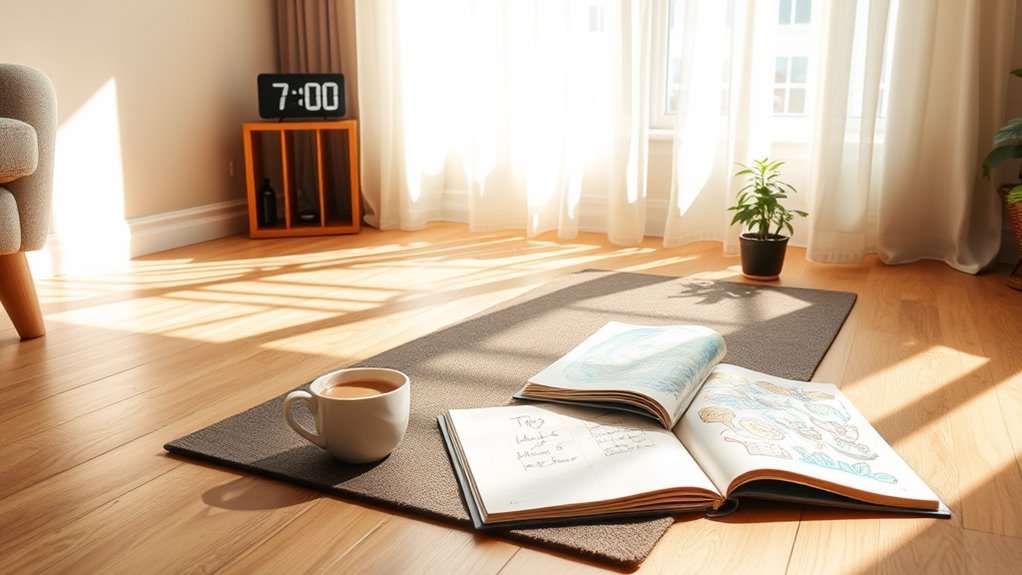How to Sleep Better With This Simple Pre-Bedtime Routine
To sleep better, start by establishing a consistent sleep schedule, aiming for seven to nine hours each night. Set a calming pre-bedtime environment with dim lights and a cool temperature. Limit screen time an hour before bed, replacing it with relaxing activities like reading or journaling. Incorporate mindfulness techniques, like deep breathing or meditation, to manage stress. Keep a sleep diary to track habits and identify patterns influencing your rest. There’s more to discover for improving your sleep.
Key Takeaways
- Establish a consistent bedtime and wake-up time to regulate your body’s internal clock for better sleep quality.
- Create a calming pre-bedtime environment by dimming lights, keeping the room cool, and using soothing scents.
- Limit screen time at least an hour before bed to reduce blue light exposure and promote natural sleep cycles.
- Engage in relaxing activities like reading, journaling, or practicing mindfulness meditation to help unwind before sleep.
- Maintain a sleep diary to track patterns and adjust your routine for improved sleep quality over time.
Understanding the Importance of Sleep
Sleep is an essential component of your overall health and well-being. Understanding its importance can transform your life.
When you prioritize better sleep, you enhance cognitive function, emotional stability, and physical health. Quality sleep fuels your body, allowing it to recover and regenerate. It strengthens your immune system and supports weight management, making it crucial for anyone aiming for peak performance. Additionally, prioritizing sleep can significantly improve your overall quality of life, leading to greater satisfaction in daily activities.
Lack of sleep, on the other hand, can lead to chronic fatigue, decreased focus, and increased stress. By acknowledging sleep’s role in your daily life, you set the foundation for a healthier lifestyle.
Invest time in learning about sleep hygiene and its benefits, and you’ll quickly realize that achieving better sleep isn’t just a luxury; it’s a necessity for mastery in all endeavors.
Establishing a Consistent Sleep Schedule
To improve your sleep, set a consistent bedtime and wake-up time each day. This routine helps regulate your body’s internal clock, making it easier to fall asleep and wake up refreshed. Try to limit variations on weekends to maintain this rhythm. Additionally, incorporating simple nighttime rituals can further enhance the quality of your sleep.
Set a Sleep Time
Establishing a consistent sleep schedule can greatly improve your overall rest quality. To master this, choose a specific time to go to bed each night and stick to it, even on weekends. Your body thrives on routine, so aim for the same sleep time daily.
This consistency helps regulate your internal clock, making it easier to fall asleep and wake up feeling refreshed.
As you set your sleep time, consider your daily commitments and how much rest you need to function effectively. Aim for seven to nine hours of sleep each night, adjusting your bedtime accordingly. Additionally, incorporating mindful practices into your evening routine can further enhance your relaxation and prepare your mind for sleep.
Limit Weekend Variations
Maintaining your sleep schedule on weekends is just as important as sticking to it during the week. If you sleep in on Saturday and Sunday, you disrupt your body’s internal clock, making it harder to wake up refreshed on Monday.
Aim to keep your wake-up time consistent, even on days off. This consistency reinforces your body’s natural rhythm, enhancing your overall sleep quality.
You might feel tempted to indulge in late nights and lazy mornings, but resist that urge. Instead, prioritize a balanced sleep routine.
Create a calming pre-bedtime environment and stick to your established bedtime. By limiting weekend variations, you’re not just improving your sleep; you’re mastering the art of restful living. Additionally, transforming your sleep with simple changes can make a significant impact on your overall well-being.
Your future self will thank you.
Creating a Relaxing Pre-Bedtime Environment
Creating a soothing atmosphere before bedtime can markedly improve your sleep quality. Start by dimming the lights to signal your body that it’s time to unwind.
Consider using soft, warm lighting, such as lamps or candles, to enhance relaxation. Keep your bedroom cool—around 60-67°F (15-19°C) is ideal for sleep.
Incorporate calming scents, like lavender or chamomile, using essential oils or a diffuser. Declutter your space to promote tranquility; a tidy environment fosters a clearer mind.
Finally, invest in comfortable bedding that supports restful sleep. By carefully curating your pre-bedtime environment, you’ll set the stage for a peaceful night’s rest, allowing you to wake up refreshed and ready to conquer the day. Additionally, a simple evening routine can help embrace serenity and further enhance your relaxation before sleep.
Limiting Screen Time Before Bed
Although it might be tempting to scroll through your phone or binge-watch your favorite series before bed, limiting screen time is essential for improving your sleep. The blue light emitted by screens disrupts your body’s natural circadian rhythm, making it harder to fall asleep.
Aim to shut down your devices at least an hour before bedtime. This allows your mind to unwind and signals your body that it’s time to prepare for rest. Instead, consider engaging in activities that promote relaxation, like reading a physical book or journaling.
Incorporating Relaxation Techniques
To improve your sleep, try incorporating relaxation techniques into your nightly routine.
Deep breathing exercises can calm your mind, while mindfulness meditation helps you focus and let go of stress.
Both practices create a peaceful environment that sets the stage for a restful night.
Deep Breathing Exercises
Deep breathing exercises can greatly enhance your sleep quality by promoting relaxation and calming your mind.
To practice, find a comfortable position and close your eyes. Inhale deeply through your nose for a count of four, allowing your abdomen to expand. Hold that breath for a count of four, then slowly exhale through your mouth for another count of four.
Repeat this cycle for several minutes, focusing solely on your breath. As thoughts arise, gently redirect your attention to the rhythm of your breathing.
This technique lowers your heart rate and reduces stress hormones, creating a tranquil state conducive to sleep. Incorporate these exercises into your nightly routine, and you’ll find it easier to unwind and drift off peacefully.
Mindfulness Meditation Practices
Mindfulness meditation practices can greatly improve your sleep by helping you cultivate a sense of present-moment awareness and relaxation.
To start, find a quiet spot where you won’t be disturbed. Sit comfortably, close your eyes, and take a few deep breaths. Focus on your breath as it flows in and out, anchoring your attention in the present.
If your mind wanders, gently guide it back to your breath without judgment. You can also incorporate body scans, where you mentally check in with each part of your body, releasing tension as you go.
Aim for just 10 minutes before bed. Consistent practice not only calms your mind but also trains you to embrace stillness, paving the way for restorative sleep.
The Role of Nutrition in Sleep Quality
While you’ve probably heard that sleep is essential for overall health, you may not realize just how much your nutrition impacts your sleep quality. The foods you consume can either promote restful sleep or disrupt it.
To master your nutrition for better sleep, consider the following:
-
Limit caffeine intake in the afternoon and evening to avoid restlessness.
-
Incorporate magnesium-rich foods**** like leafy greens and nuts, which help relax your muscles.
-
Opt for complex carbohydrates**** such as whole grains, which can boost serotonin levels and improve sleepiness.
-
Avoid heavy meals close to bedtime; instead, snack on light options like yogurt or a banana.
Engaging in Light Physical Activity
Engaging in light physical activity can greatly improve your sleep quality.
Simple exercises like stretching or taking a leisurely walk before bed help relax your body and mind.
Let’s explore the best activities to incorporate into your evening routine.
Benefits of Light Exercise
Light exercise can considerably improve your sleep quality, especially when you incorporate it into your daily routine. Engaging in light physical activity not only helps you wind down but also offers several benefits:
-
Reduces Stress: Light exercise releases endorphins, lowering your stress levels and calming your mind.
-
Enhances Mood: Regular movement boosts serotonin production, improving your overall mood and emotional well-being.
-
Increases Energy: Even gentle activity can boost your energy levels, making it easier to stay alert during the day.
-
Promotes Relaxation: Activities like stretching or walking signal your body that it’s time to relax, preparing you for a restful night.
Best Activities Before Bed
As you wind down for the evening, incorporating gentle activities into your pre-bedtime routine can greatly enhance your sleep quality. Engaging in light physical activity, like stretching or a leisurely walk, can help signal to your body that it’s time to relax. Here’s a quick guide to the best activities before bed:
| Activity | Benefits |
|---|---|
| Stretching | Relaxes muscles |
| Yoga | Reduces stress levels |
| Light walking | Promotes blood circulation |
| Deep breathing | Calms the mind |
Integrating these activities into your evening can help lower anxiety and prepare your body for rest. By making these small adjustments, you’re paving the way for a more restorative sleep experience.
Managing Stress and Anxiety
Managing stress and anxiety is essential for achieving a good night’s sleep, especially since these feelings can often keep you awake.
To effectively manage these emotions, try implementing these strategies:
-
Establish a wind-down routine****: Spend 30 minutes before bed engaging in calming activities, like reading or light stretching.
-
Limit caffeine and alcohol: Avoid these stimulants in the evening; they can heighten anxiety and disrupt sleep.
-
Journal your thoughts: Write down your worries before bed to release them from your mind, allowing for a clearer sleep.
-
Create a sleep-friendly environment: Guarantee your bedroom is dark, cool, and quiet to promote relaxation.
Practicing Mindfulness and Meditation
Practicing mindfulness and meditation can greatly enhance your sleep quality, especially when you incorporate these techniques into your nightly routine. By dedicating just a few minutes each evening, you can cultivate a calming environment that prepares your mind for rest.
Start with deep breathing exercises; inhale deeply through your nose, hold for a few seconds, then exhale slowly. This simple practice grounds you in the present moment, reducing racing thoughts.
Next, try a body scan meditation, focusing on each part of your body and releasing tension. Visualize serene landscapes or repeat a calming mantra to deepen relaxation.
Consistency is key; make these practices a habit, and you’ll notice significant improvements in your sleep and overall well-being.
Keeping a Sleep Diary
Keeping a sleep diary can be a powerful tool for improving your sleep habits, especially when you track your patterns and behaviors over time.
By documenting your sleep, you’ll gain clarity on what affects your rest. Here’s how to effectively maintain your diary:
-
Record Your Sleep Times****: Note when you go to bed and wake up.
-
Monitor Sleep Quality****: Rate your sleep on a scale from 1 to 10 each morning.
-
Track Daily Activities: Include exercise, meals, and caffeine intake.
-
Reflect on Mood: Jot down your emotional state before bedtime and upon waking.
Evaluating and Adjusting Your Routine
Reviewing your sleep diary can reveal patterns and habits that either support or hinder your sleep quality. Identifying these trends is essential for refining your routine. Look for consistent factors that correlate with your best sleep nights versus poor ones.
| Factor | Impact on Sleep |
|---|---|
| Screen time before bed | Negative |
| Consistent bedtime | Positive |
| Caffeine intake | Negative |
After pinpointing these elements, adjust your routine accordingly. If late-night screen time disrupts your sleep, eliminate it. If going to bed at the same time improves restfulness, stick to that schedule. Regularly reassess your diary to guarantee your adjustments lead to mastery over your sleep quality.
Frequently Asked Questions
What Time Should I Stop Eating Before Bed?
Picture your body winding down like a clock. To optimize your sleep, aim to stop eating at least two to three hours before bed. This allows digestion to settle, promoting a restful night’s sleep.
Is It Okay to Nap During the Day?
Napping during the day can be beneficial, but keep it short—15 to 30 minutes. If you nap too long, you might disrupt your nighttime sleep. Listen to your body, and adjust accordingly for ideal rest.
How Long Should My Pre-Bedtime Routine Be?
Your pre-bedtime routine should ideally last 30 to 60 minutes. This timeframe allows you to unwind, disconnect, and prepare your mind and body for sleep, ensuring a more restful night ahead.
Can Aromatherapy Really Help With Sleep?
Aromatherapy’s soothing scents can greatly support sleep. By selecting calming essential oils like lavender or chamomile, you’ll create a serene atmosphere, helping your mind and body relax, resulting in a more restful night’s sleep.
What if I Wake up During the Night?
If you wake up during the night, stay calm. Focus on your breathing, and avoid checking the time. Instead, visualize a peaceful scene or practice relaxation techniques to help you drift back to sleep.





